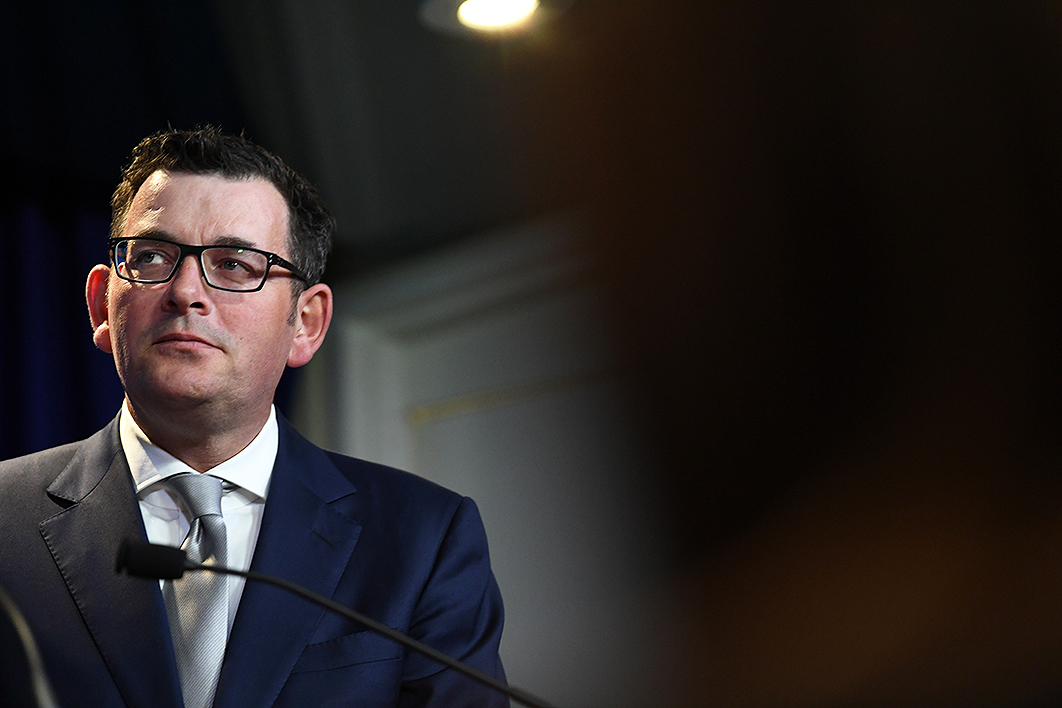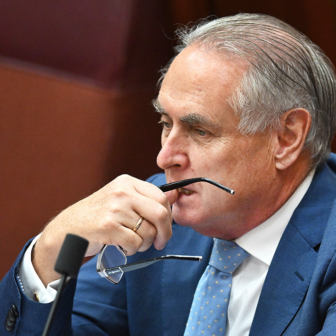Back in 2009, when Labor’s John Brumby was premier, the Melbourne Age revealed how Progressive Business, a state Labor Party entity, went about raising funds. Under the headline “$10,000 to Sit Next to Brumby,” the newspaper detailed how businesses had paid significant amounts for access to senior ministers. In response, Brumby invoked the “democratic right” of people and businesses to donate to the party.
The Age continued to make fresh revelations, yet both sides of politics remained committed to the status quo, even after the political finance scandal in New South Wales in 2014. Politicians south of the Murray River were cut from a superior moral cloth, of course — or so the argument went. A typical response came from special minister of state Gavin Jennings, who was sceptical about the need for change because Victoria had a “cleaner” political culture than its neighbour to the north.
That era of complacency came to an abrupt end last year when Labor premier Daniel Andrews announced changes to the state’s political finance laws. And what an emphatic turnaround it was, with the premier promising “the strictest and most transparent political donation laws in Australia.” When he tabled the Electoral Legislation Amendment Bill earlier this month, Jennings claimed that “these tough new donation laws will be the strictest and most transparent in the country” and were “long overdue.” For attorney-general Martin Pakula, the bill marked “a new era of transparency and accountability.”
Will the Electoral Legislation Amendment Bill “enhance the integrity of the electoral system,” as its purposes state? As usual, the devil is in the detail.
Donations, “political” and otherwise
The Victorian bill has five key elements: caps on political donations; obligations to disclose these donations; a ban on foreign donations; increases in public funding of parties and candidates; and new compliance measures. At its core is the concept of a “political donation,” which determines the scope — and efficacy — of all of these measures except for increased public funding.
So what is a political donation? The only Australian state that currently imposes caps on “political donations” is New South Wales. In its Election Funding, Expenditure and Disclosures Act, a “political donation” extends to pretty much any “gift” made to a registered party, an elected member or a candidate; it also captures “gifts” made to “third-party campaigners” who might make “political donations” or incur “electoral expenditure.”
Unlike its NSW counterpart, the Victorian bill excludes gifts between registered parties and their “nominated entities.” Registered parties can appoint as their “nominated entity” any party-controlled incorporated body that operates for the sole benefit of the members of the party but does not have voting rights in the party.
In his second reading speech, the Victorian attorney-general explained that a nominated entity is a “new class of entity, introduced to address the operational and organisational structures that may exist for registered political parties in Victoria.” He was being coy: the intent seems to be to exempt from the category of “gifts” transfers between the investment and fundraising vehicles of the Victorian branches of the Labor Party and the Liberal Party, including Progressive Business and the Cormack Foundation.
Also exempted from the definition of “gift” are annual affiliation fees. The obvious — but unstated — reason for this provision is to exempt trade-union affiliation fees (which Labor receives) from the caps. There are certainly compelling reasons for not treating these fees in the same way as other political contributions, but this bill goes too far by placing no limits on the fees. The NSW legislation treats these fees as “gifts” but exempts them from caps up to certain limits (calculated at $2000 for each member of the affiliated organisation).
Under the Victorian bill, “political donations” to “associated entities” and “third party campaigners” only occur when a “gift” is used (or intended to be used) to enable these entities to make a “political donation” or incur “political expenditure” (or to reimburse them for these expenses). In other words, the meaning of “political donation” is intertwined with the meaning of “political expenditure.” Here, the bill proposes the narrowest definition of “political expenditure” found in any Australian political finance laws:
political expenditure means any expenditure for the dominant purpose of directing how a person should vote at an election, by promoting or opposing —
(a) the election of any candidate at the election; or
(b) a registered political party which has endorsed any candidate at the election.
Compare that with how the NSW legislation defines “electoral expenditure”:
“electoral expenditure” is expenditure for or in connection with promoting or opposing, directly or indirectly, a party or the election of a candidate or candidates or for the purpose of influencing, directly or indirectly, the voting at an election.
As the Victorian government acknowledges, political expenditure will not include “advertising and raising awareness about issues, without promoting or opposing a candidate or political party.” This will exempt most spending on non-party campaigns (opposition to a new freeway, for example) as well as spending that doesn’t involve “directing how a person should vote at an election.” Spending that doesn’t involve direct communication with voters is also unlikely to be “political expenditure,” and could include campaign research and payments for staff to organise party activists.
Even when parties communicate directly with voters, they will not be making “political expenditure” if they don’t try to “direct” people’s voting decision. Consider, for example, the “Putting People First” (Labor) and the “Who’s Going to Pay?” (Liberal) ads run during the last state election campaign. Neither of them directed a voter as to how to vote; neither of them used words such as “vote for” or “vote against.” If contributions are made to trade unions and industry associations to run similar ads, it is likely that these funds won’t be considered “political donations” because spending on these ads is not “political expenditure.”
The cap gap
This narrow definition of political expenditure means that Victoria’s cap on “political donations” for the period between each state election — set at an indexed $4000 — can’t be compared directly with caps on donations in New South Wales, which currently stand at $6100 per year for registered political parties, or $24,400 for each four-year term. Victoria’s might be stricter, but they apply to a narrower range of spending, at least for the major parties.
The exemptions in relation to “nominated entities” and annual affiliation fees will limit the application of the caps to all registered political parties, but especially Labor and the Liberals. Both those parties will benefit from the relatively loose rules for “associated entities” and “third party campaigners,” and Labor will benefit from the generous exemption for union affiliation fees. It is the political parties that aren’t able to benefit from these exemptions — all the rest, in other words — that will bear the brunt of caps being the strictest in the country.
Disclosures: better but not best
The Victorian bill tightens the requirements for annual returns by parties and introduces “real time” disclosure of donations. Annual returns will need to include details of donations of $1000 or more (indexed) — a vast improvement on current obligations, which mirror the federal government’s much-criticised cut-off point of $13,200 (indexed).
A vast improvement this might be, but the new annual returns hardly merit being characterised as the strictest disclosure obligations in the country. Queensland, for example, requires biannual returns with details of amounts of $1000 or more to be provided.
The claim that the Victorian bill creates “the most transparent political donation laws in Australia” rests on the second of the new disclosure obligations, which will mean, according to Gavin Jennings, that “for the first time Victorians will be able to see political donations being disclosed in real time.”
But if “real time” means instantaneous, then the bill does nothing of the sort. “Political donations” of $1000 or more (indexed) only need to be disclosed to the Victorian Electoral Commission twenty-one days after receipt; the VEC is then obliged to publish these returns within seven days. This means that details of the donations may not be revealed until twenty-eight days after their receipt.
While they’re not quite “real time,” these general disclosure obligations are the most timely of all Australian jurisdictions (which provide at most for biannual disclosure). At the same time, they are not as timely as the regime that applies to large donations in Queensland, where donations of $100,000 or more in a six-month period to registered political parties and their “associated entities” must be disclosed to the Queensland Electoral Commission within seven working days.
There is a deeper difficulty with the “real time” disclosure obligation. Unlike the obligations applying to annual returns, these obligations only apply to “political donations.” The bill’s definition will mean that details of the following won’t need to be disclosed, regardless of the amount: gifts between registered political parties and their nominated entities; gifts to “associated entities” and “third party campaigners” to spend on issue advocacy; and gifts to these organisations to spend on promoting or opposing a candidate or party without directing voters how to vote.
Regulating the “foreign” donor
The bill also prohibits “political donations” being made by an individual who is not an Australian citizen or an “Australian resident” (generally citizens and permanent residents) or by an entity that does not have a relevant Australian business number.
The Victorian bill will bring to three the number of states banning “foreign” political contributions, and is the broadest in terms of who is considered foreign. In New South Wales, those who don’t have an Australian residential address are considered “foreign” (or, more accurately, those who can’t supply acceptable identification showing such an address). In Queensland, it is the gift of “foreign property” to registered political parties and candidates that is prohibited — in essence, funds located outside Australia.
Once again, the limited meaning of “political donations” as it applies to “associated entities” and “third party campaigners” calls into question the claim that the Victorian ban is the strictest in the country. Unlike the NSW and Queensland bans, gifts to “associated entities” and “third party campaigners” to spend advocating on an issue or promoting or opposing a candidate or party without “directing” voters will not be covered.
Tilting the public funding playing field
Equally important — but mentioned sotto voce by the government — are two measures that will significantly increase public funding of political parties, especially parties with parliamentary representation, at a combined cost of $45 million over four years.
The first is a change to the scheme that provides public funding for election expenditure. Payments under this scheme are made to candidates who have received at least 4 per cent of the total number of first-preference votes in the elections they contest, and are calculated at a fixed rate per first-preference vote (around $1.75 per vote at the coming state election).
After this year’s election, the formula and amounts will change. Each first-preference vote for a candidate for the Legislative Assembly will attract $6, and each first-preference vote for a candidate for the Legislative Council will attract $3. According to the government, these changes reflect “stringent new donation rules and limit the influence of private donations in the political process.”
The other change introduces a new stream of public funding — but only for parties already represented in parliament. Quarterly payments for administrative expenditure will be paid to these parties, and to independent MPs, at an indexed rate of $10,000 per member. This is intended, according to the government, “to help elected members of parliament meet the administrative costs of running their offices and complying with the new disclosure and reporting requirements.”
The increases in the level of funding will make Victoria the second-most-generous jurisdiction after the Australian Capital Territory (which allocates around $8 per first-preference vote). Victoria will be unique in differentiating between votes cast for the lower and upper houses, disadvantaging the minor parties that focus their energies on the Legislative Council. It compares even more unfavourably with South Australia, which seeks to offset some of the advantages of established parties by giving more generous public funding for the first 10 per cent of first-preference votes.
The proposed administrative expenditure funding will also make Victoria the second-most generous of the five jurisdictions offering such funding, this time behind New South Wales (which provides in the range of $100,000 to $200,000 per parliamentarian). Like New South Wales, South Australia and the Australian Capital Territory, Victoria calculates the amount according to the number of parliamentarians. (Queensland uses the proportion of first preference votes.) This, too, will tend to favour established parties, a fact that the NSW legislation recognises with offsetting measures such as a declining rate of entitlement for the number of parliamentarians and a separate pool of money, the Policy Development Fund, for parties without parliamentary representation.
The key question is whether these measures enhance or detract from electoral integrity. When it’s applied to political funding, electoral integrity is a multifaceted concept resting on four principles: protecting the integrity of representative government (particularly through the prevention of corruption and undue influence); promoting fairness in politics, especially in elections; respecting political freedoms; and supporting political parties to discharge their democratic functions.
This matrix of principles enables us to draw up a fuller assessment of the bill. The restrictions it places on “political donations” (caps and disclosure) clearly place a limit on political freedoms, but given the levels and exemptions it is difficult to characterise the restrictions as disproportionate to the goal of preventing corruption and undue influence. The proposed disclosure obligations, while not quite “real time” disclosure, will bring about definite improvements in transparency. And the proposed compliance measures will also strengthen the incentive of political actors to play within the rules.
But the sizeable gaps in the restrictions on “political donations” undermine the premier’s claim that the new laws “will eliminate large political donations” and “give Victorians confidence that governments are making decisions on their merits, not repaying favours to big political donors.”
Three other provisions of the bill further weaken these claims. First, “political donations” paid into an account kept exclusively for the purposes of a Commonwealth election campaign are exempted from the bill’s caps (though not from disclosure obligations). This will mean that large, unlimited amounts can be given to Victorian parties so long as they are paid into such an account.
While there are legitimate constitutional reasons for this exemption, creative ways could have been devised to address the problems with political fundraising by Victorian parties for Commonwealth electoral campaigns. For instance, agreement could have been sought among parties in the Victorian parliament to replicate the measures in the bill as they apply to funds for Commonwealth electoral campaigns (and have them policed by the Victorian Electoral Commission). As this agreement is not state legislation, it would not be at risk of being struck down.
Some of the bill’s compliance provisions also undermine the government’s claims about its significance. The new powers for the Victorian Electoral Commission are welcome, as are the penalties for contravening the caps (including deduction from public funding payments of twice the amount made in contravention). But the weak prohibition of anonymous donations threatens compliance. There are good reasons for allowing anonymous donations of small amounts (around $50) — requiring details of these amounts would impose significant administrative burdens when the risk of corruption is non-existent — but prohibiting only those anonymous donations of $1000 or more sets too low a bar. Details of donations of hundreds of dollars won’t need to be recorded, which may result in the absence of the paper trail necessary for enforcing the caps.
Compliance could also be compromised by the requirement for state campaign accounts. Although they are supposed to be the main portal for receiving and spending election campaign funds, the bill clearly fails to effect this purpose. Funds that are not “political donations” (annual affiliation fees, for example) don’t have to be paid into these accounts, and spending that is not “political expenditure” need not be incurred through these accounts. Political parties could comply with legislation and yet still set up separate accounts for state campaign spending on items that are not “political expenditure” (including advertisements that don’t direct voters, campaign research, and payments for organisers).
In fact, the bill not only fails to live up to the government’s rhetoric, it will also detract from the integrity of Victorian elections. Political freedoms will be unduly restricted by the ban on “foreign” political donations. This ban — which applies regardless of the amounts given — will place onerous burdens on regulated organisations, especially less well-resourced groups. Worse, it wrongly limits political participation (through contributions) by residents of Australia, such as people on temporary visas, and favours foreign entities that can acquire an Australian business number (without demonstrating that their principal activities are in Victoria) over “foreign” individuals.
All this for what?
Consider the two donors at the centre of the controversy over “foreign” political donations: Chau Chak Wing and Huang Xiang Mo. Neither of them will be banned by the bill from making political donations — Chau has been an Australian citizen for decades and Huang is a permanent resident. If they weren’t, the businesses owned by these donors would probably fall outside these restrictions because they would have relevant business numbers.
The most serious vice of the bill is the increased unfairness that will result from an even more unequal flow of public and private funds. Both the administrative expenditure payments and the public funding payments for electoral expenditure will advantage established parties. The caps on “political donations” will further tilt the electoral contest in favour of Labor and the Liberal Party through the exemptions relating to “nominated entities” and trade-union affiliation fees.
Less obviously, this may also result through the “light touch” regulation of “associated entities” and “third party campaigners”: the activities of these organisations (trade unions and industry associations, for example) will tend to support the two parties, or at the very least be hostile towards minor parties. Admittedly, any attempt to regulate third-party campaigns faces the difficult task of balancing political freedom and engagement, on the one hand, and ensuring integrity and fairness, on the other. But the bill is imbalanced by both the breadth of its carve-out and the unequal impact of that exemption on electoral competitiveness.
The unfairness of the bill is as much a result of omission as commission. Singularly absent are limits on election campaign spending, which are essential for a level playing field in electoral contests and already exist in New South Wales, South Australia and the Australian Capital Territory. As the Canadian Supreme Court has said of the Canadian spending limits: “These provisions seek to create a level playing field for those who wish to engage in the electoral discourse. This, in turn, enables voters to be better informed; no one voice is overwhelmed by another.”
These limits also reduce the pressure for fundraising by reducing the demand for electioneering funds. As the Parliamentary Assembly of the Council of Europe recommended, “States should impose limits on the maximum expenditure permitted during election campaigns, given that in the absence of an upper threshold on expenditure there are no limits to the escalation of costs, which is an incentive for parties to intensify their search for funds.”
The absence of limits on election campaign spending in the Victorian legislation risks placing pressure on the “political donation” caps, as parties and candidates seek to meet unabated demand for campaign funds. If the bill had provided for limits on spending, they may have curbed the impact of the uneven flow of private and public funds that will result from its enactment — the limits could have acted as a barrier to unequal income translating into unequal spending.
As with any law, we must, of course, be wary of perfection being the enemy of the good. In this case, the ledger nevertheless tilts towards the shortcomings and vices of the bill. The government should go back to the drawing board and have another try at creating, in the words of the attorney-general, “a robust political donations and disclosure scheme that we can be proud of.” ●




